Consider the enigmatic tale of the Witch of Endor and the summoning of a familiar spirit, revealing ancient beliefs still resonant today.

Familiar Spirit in the Bible Samuel
Isn't it curious how the shadows of ancient beliefs still stretch into our modern understanding of spirituality?
You've likely heard of the story where King Saul, in a moment of despair, sought the Witch of Endor to summon the prophet Samuel's spirit.
This tale weaves a complex tapestry of divine laws against necromancy, the concept of familiar spirits, and theological implications that are as relevant today as they were millennia ago.
As you explore this narrative, consider how it reflects on ancient beliefs and what it reveals about the human condition's unchanging nature.
What insights might you uncover in this ancient story that still echo in today's spiritual discussions?
Key Takeaways
- Familiar spirits in the Bible, like in Samuel's story, bridge the spiritual and mortal realms, with significant theological implications.
- Saul's consultation with the Witch of Endor, seeking Samuel's spirit, highlights the dangers and moral dilemmas of necromancy.
- The narrative emphasizes the consequences of spiritual disobedience, such as Saul's loss of divine guidance and favor.
- This story reflects on the complex relationship between faith, power, and ethics in ancient cultural and religious contexts.
The Concept of Familiar Spirits
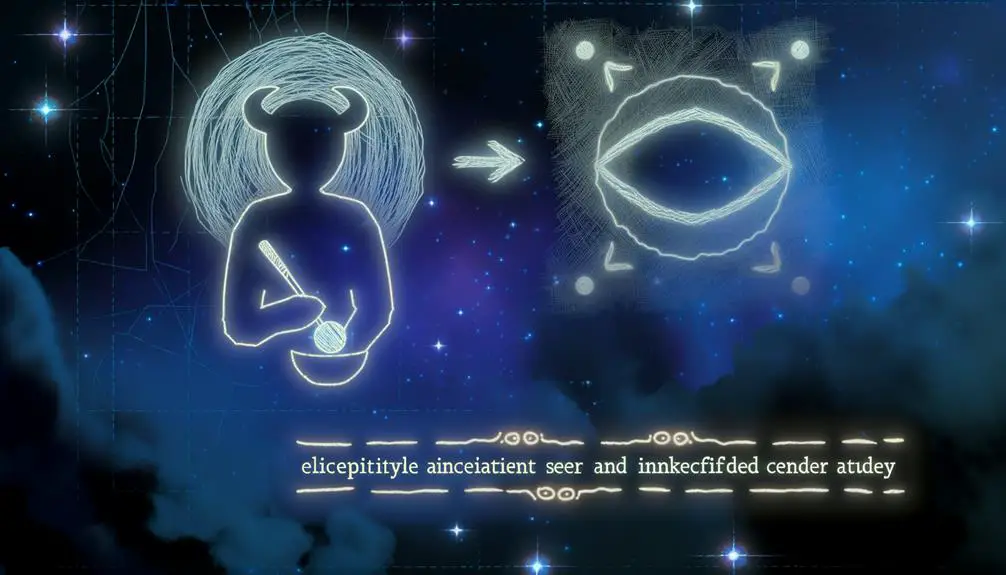
The concept of familiar spirits, deeply ingrained in biblical and historical narratives, refers to supernatural entities believed to assist or communicate with witches or mediums. These entities, often envisioned as animals or ethereal figures, serve as intermediaries between the spiritual and mortal worlds. Your understanding of this concept benefits greatly from an exploration of modern interpretations and cultural variations, which illuminate how these beings are perceived across different societies and time periods.
In modern interpretations, familiar spirits have transcended their traditional demonic or malevolent associations. Nowadays, they're often seen in a more neutral or even positive light, reflecting contemporary society's evolving views on spirituality and the supernatural. This shift is particularly evident in popular culture, where familiars are depicted as guardians or companions to those with magical abilities, highlighting a transformation in how these entities are conceptualized.
Cultural variations further enrich the understanding of familiar spirits. For instance, in European folklore, they're traditionally seen as demonic or witchcraft-related, aiding witches in their magical practices. Conversely, in some African and Asian cultures, spirits similar to familiars are seen as ancestral guides or protectors, showing a more benevolent aspect. This divergence underscores the influence of cultural background on the perception of supernatural beings.
Analyzing the concept of familiar spirits through these lenses reveals a multifaceted entity that has evolved significantly over time. By considering both modern interpretations and cultural variations, you gain a comprehensive view of how these supernatural entities are woven into the fabric of human belief and mythology, reflecting the complex relationship between humans and the unseen world.
King Saul's Despair
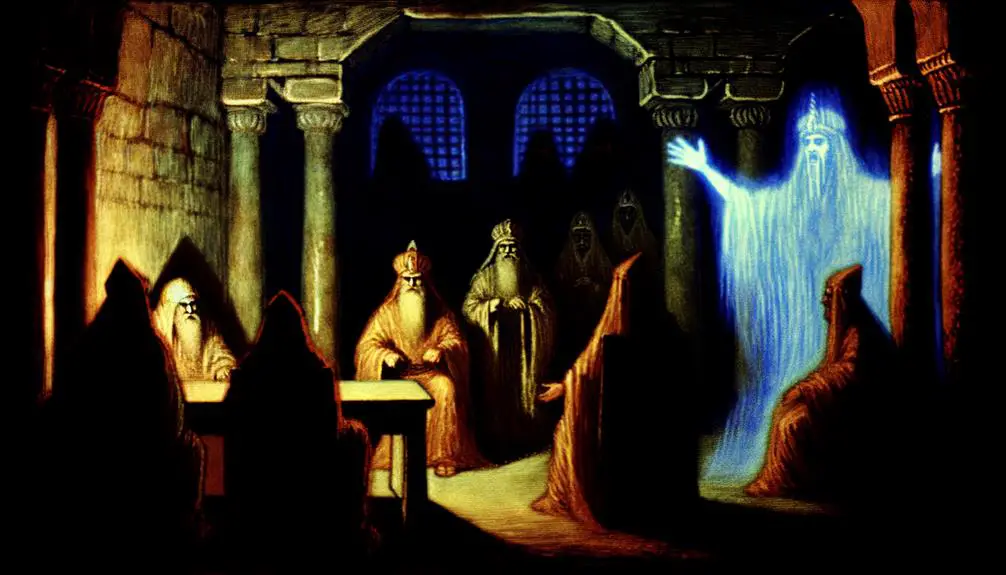
You'll observe that King Saul's despair stems from his profound need for divine guidance, which ultimately leads him to seek counsel through forbidden means.
Consulting the Witch of Endor not only marks a pivotal moment in Saul's reign but also underscores the broader theological themes of obedience and the spiritual fallout from defying Yahweh's commands.
This act precipitates significant spiritual consequences, highlighting the complex interplay between divine law, human desperation, and the pursuit of forbidden knowledge.
Saul's Quest for Guidance
In a moment of profound despair, King Saul sought divine guidance as he faced the looming threat of the Philistine army. His kingdom's survival hinged on the effectiveness of his military strategies, yet, divine silence met his pleas.
Saul's repentance for past disobedience was sincere, yet incomplete, revealing a complex character torn between duty and spiritual longing. This period underscores Saul's isolation from divine counsel, highlighting a pivotal moment where desperation began to overshadow his judgment.
His actions, driven by urgency, marked a significant deviation from traditional Israelite consultation of Yahweh. Analyzing Saul's quest for guidance, one observes a king grappling with the weight of leadership, his actions reflecting a deep-seated need for divine reassurance amidst escalating military pressures.
Consulting the Witch
Driven by desperation, Saul sought out the Witch of Endor, marking a profound departure from Yahweh's guidance and venturing into forbidden practices. This act underscores a significant moment in biblical history, reflecting the complexities of moral and ethical considerations surrounding magic and divination within ancient cultures.
- Magic ethics: Saul's consultation highlights the moral dilemmas and ethical considerations tied to magic in ancient societies.
- Cultural perceptions: It reveals how cultural norms and religious laws intersect, influencing perceptions of right and wrong.
- Forbidden practices: Engaging with the Witch of Endor illustrates the taboo surrounding necromancy, deemed unacceptable by prevailing religious standards.
- Desperation's role: Saul's actions underscore how desperation can lead individuals to defy societal norms and religious laws, seeking answers beyond conventional means.
Spiritual Consequences Faced
Saul's consultation with the Witch of Endor not only breached divine law but also precipitated profound spiritual consequences that would mar the remainder of his reign and personal wellbeing.
Aspect |
Impact |
|---|---|
Spiritual Integrity |
Severely compromised, leading to divine disfavor. |
Psychological State |
Plunged into despair, unable to find peace or guidance. |
Ethical Considerations |
Set a precedent of moral ambiguity for future leaders. |
Modern Parallels |
Reflects today's ethical dilemmas in pursuing forbidden knowledge. |
Leadership Legacy |
Tarnished, with his actions cautioning against spiritual disobedience. |
You're witnessing the fallout of Saul's decision, a stark reminder of the spiritual and ethical quagmires that ensnare those seeking power outside divine sanction. This episode serves not just as a biblical cautionary tale but also prompts a reflection on contemporary ethical considerations and the pursuit of guidance in defiance of moral codes.
The Witch of Endor
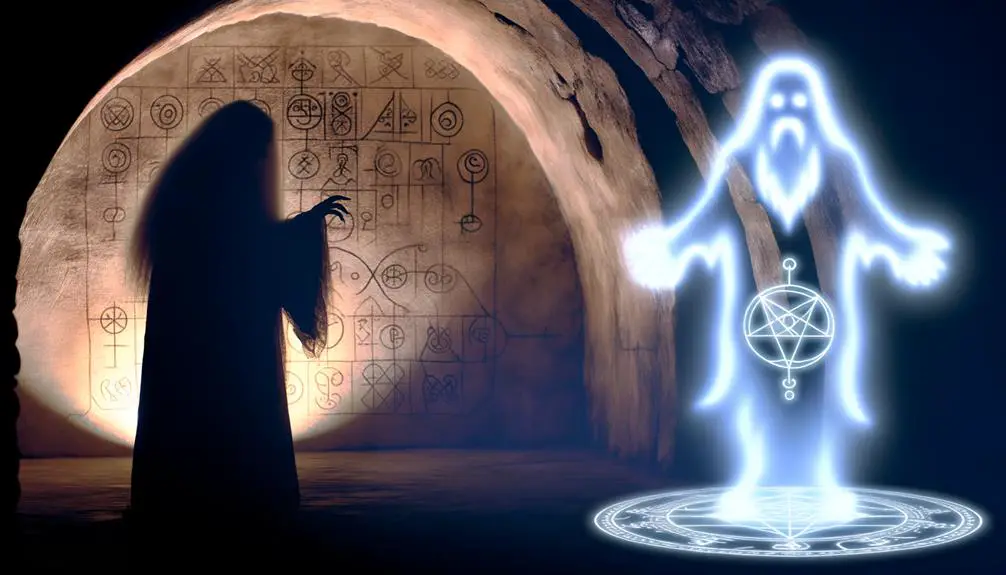
You'll find that the narrative of the Witch of Endor is pivotal in understanding the complexities of necromancy within biblical texts.
This account, involving Saul's clandestine visit to summon the spirit of the deceased prophet Samuel, illustrates the lengths to which despair can drive individuals, even to contravene divine prohibitions.
Consequently, this episode not only showcases the immediate repercussions of Saul's actions but also offers a broader commentary on the consequences inherent in seeking knowledge from the dead.
Summoning the Dead
In an act of desperation, King Saul turns to the Witch of Endor to summon the spirit of the deceased prophet Samuel, an event that not only defies the biblical prohibitions against necromancy but also reveals profound insights into the nature of divine prohibition and human frailty.
- Modern perspectives often view this story through the lens of psychological need and cultural narrative, contrasting with ancient understandings of the supernatural.
- Cultural comparisons show a fascinating variety in attitudes towards necromancy, from strict taboo to revered practice.
Analyzing this event sheds light on the complexities of faith, power, and the afterlife in biblical times.
The episode serves as a pivotal moment, illustrating the lengths to which individuals will go when confronted with their own limitations and the divine will.
Saul's Desperate Quest
Facing imminent defeat and feeling abandoned by God, King Saul sought the services of the Witch of Endor. This decision marked a pivotal moment in biblical narratives on divine law and human desperation. This act not only foreshadowed Saul's downfall but also emphasized the leadership vacuum that plagued his reign.
By turning to necromancy, Saul directly violated divine commandments, illustrating his ultimate detachment from the spiritual guidance that once legitimized his kingship. This desperate quest for power and guidance outside the divine order showcases the complex interplay between faith, power, and the human condition.
Saul's actions at Endor serve as a cautionary tale about the perils of forsaking divine guidance in favor of illicit means to resolve crises, highlighting the fragility of human leadership when severed from its spiritual anchor.
Consequences of Necromancy
Saul's decision to consult the Witch of Endor not only marked a breach of divine law but also set the stage for the dire repercussions that ensued from engaging in necromancy. This act spotlighted the consequences of crossing ethical boundaries and the onset of moral decay. Consider the fallout:
- Erosion of Ethical Standards: Society's moral fabric weakens when supernatural practices overshadow lawful conduct.
- Divine Disfavor: Engaging in forbidden practices invites divine judgment, severing the individual's connection with the sacred.
- Psychological Turmoil: The practitioner often faces mental unrest and guilt, knowing they've transgressed moral limits.
- Community Distrust: Such actions breed suspicion and isolation within the community, as trust in the individual's integrity erodes.
These consequences underscore the importance of adhering to established moral and ethical guidelines, especially when faced with desperation.
Summoning Prophet Samuel
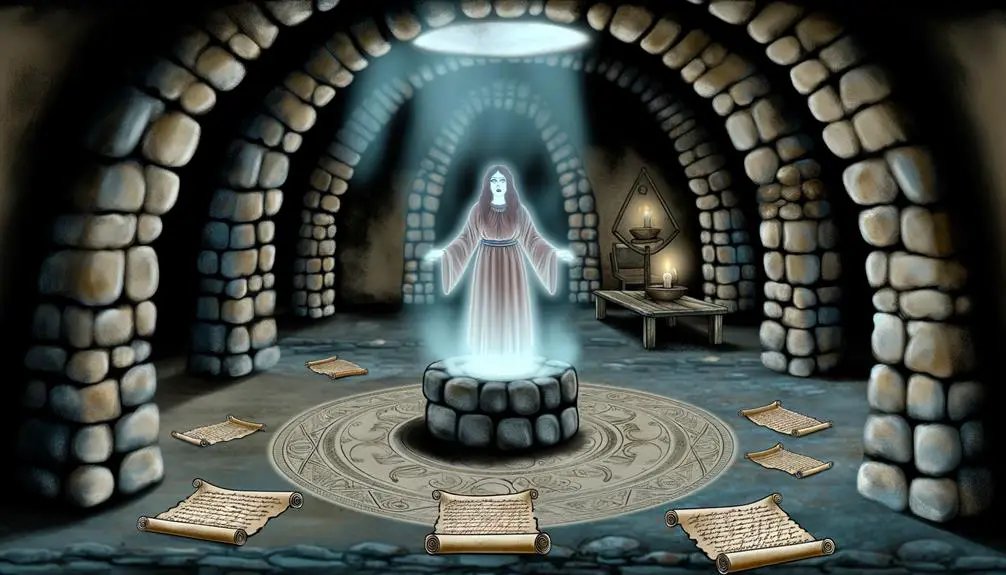
You'll find that the biblical narrative of summoning Prophet Samuel involves a complex interplay of faith, power, and desperation, culminating in an event that has intrigued scholars for centuries. At the heart of this tale is King Saul, who, in a moment of dire need, seeks guidance from the deceased prophet, Samuel. This act raises significant ethical considerations, as it directly challenges the established norms and beliefs of the time. The ritual methodologies employed to summon Samuel also merit close examination.
The medium of En-dor, a woman possessing what's described as a 'familiar spirit', plays a pivotal role in this narrative. Her practices, which involve conjuring the spirit of Samuel, provide a rare biblical glimpse into the ancient methods of necromancy. The process, as described, is shrouded in mystery and ritualistic complexity, suggesting a well-established procedure for contacting the dead.
Analyzing the ethical considerations, one can't help but ponder the desperation that led Saul to seek such forbidden knowledge. His actions reflect a profound moral dilemma, weighing the societal taboos against the pressing need for divine guidance. Furthermore, the ritual methodologies highlighted in this narrative offer a fascinating insight into the lengths individuals might go to bridge the gap between the living and the dead.
This event's detailed examination underscores the nuanced relationship between faith, ethical boundaries, and the human desire for knowledge and guidance, presenting a rich tapestry of themes for scholarly exploration.
Divine Law Against Necromancy
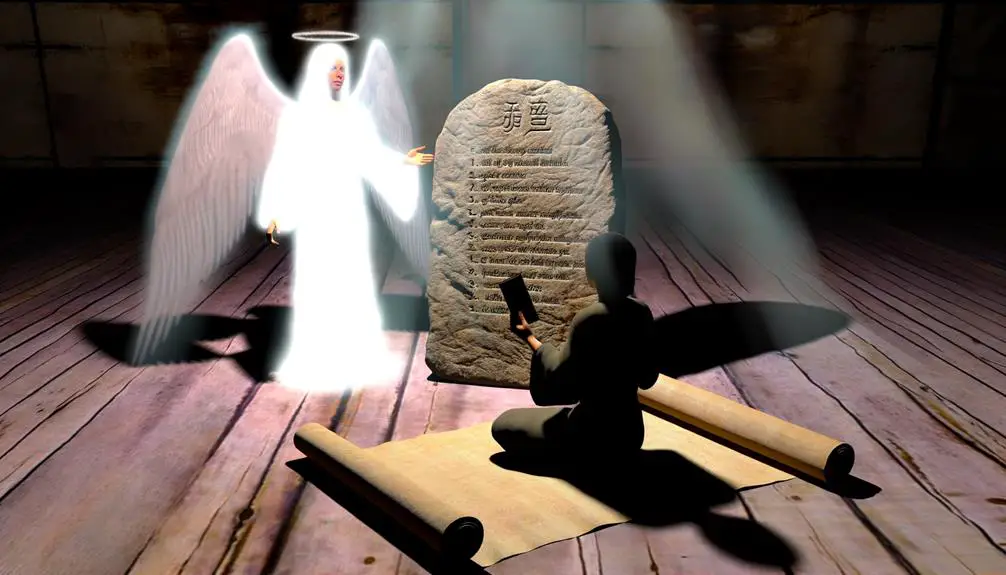
The biblical prohibition against necromancy is unequivocally outlined in various scriptures, serving as a stark reminder of the divine law that King Saul transgressed in his quest to summon Samuel. This act, seen as a direct violation of divine commandments, opens up a rich field of analysis concerning both legal implications and cultural perceptions surrounding necromancy.
- Legal Implications: The biblical injunctions served not only as religious guidelines but also as legal statutes within the ancient Israelite community. These laws underscored the belief in the sanctity of life and the afterlife, marking necromancy as a capital offense—a clear demarcation of societal norms and legal boundaries.
- Cultural Perceptions: The explicit ban reflects a broader cultural perception that viewed necromancy as an abomination. This societal disdain is rooted in the belief that such practices disrupt the natural order and the divine plan, leading to spiritual corruption and communal contamination.
- Historical Context: Understanding the historical context in which these laws were formulated and enforced sheds light on the severity of Saul's actions. It wasn't merely a religious transgression but a significant breach of societal law and order.
- Theological Depth: While avoiding theological implications, it's essential to recognize that the legal and cultural frameworks are deeply intertwined with the theological underpinnings of ancient Israelite society, reflecting a comprehensive worldview where law, culture, and religion were inextricably linked.
In analyzing the divine law against necromancy, it's crucial to appreciate the multifaceted implications of Saul's actions, which weren't only a personal failing but also a societal and legal breach, reflecting the complex interplay between legal statutes, cultural perceptions, and religious beliefs.
Theological Implications
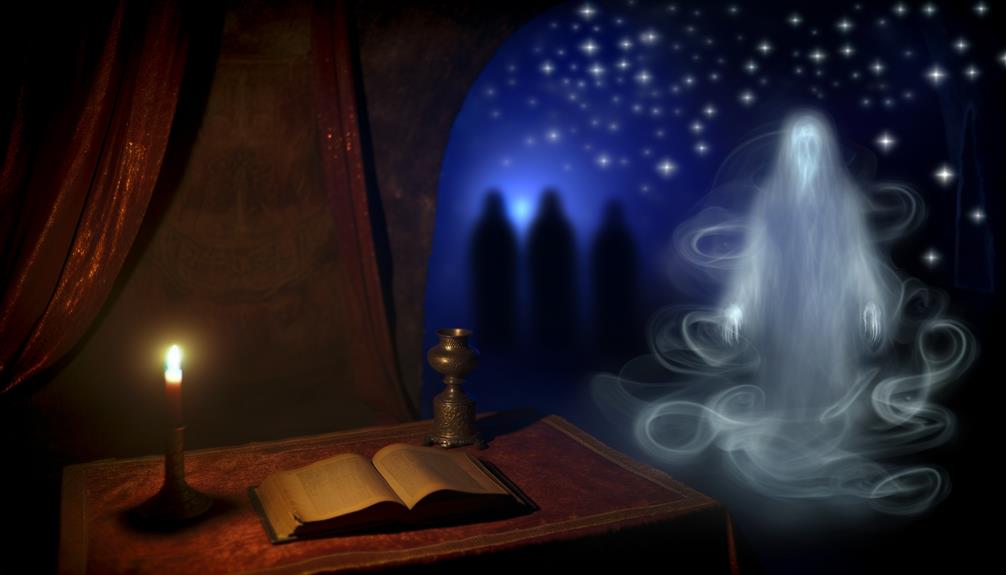
Having explored the legal and cultural dimensions of necromancy's prohibition, let's now consider its profound theological implications within the biblical narrative. The narrative surrounding the familiar spirit in Samuel doesn't just serve as a historical account or a legal precedent; it delves into the complex interplay between divine mandate, human agency, and the spiritual realm. This interplay is crucial for understanding the broader theological messages of the Bible.
Aspect |
Biblical Context |
Modern Interpretations |
|---|---|---|
Divine Sovereignty |
God's ultimate authority over life, death, and the afterlife |
Challenges our autonomy and control |
Human Agency |
Choices humans make in light of divine law |
Reflects on our responsibility and ethics |
Spiritual Boundaries |
Forbidden interactions with the dead |
Questions about spiritual practices today |
From a theological standpoint, the story raises important ethical considerations. It prompts us to ask: what are the boundaries of human pursuit of knowledge and power, especially when such pursuits lead us into realms designated off-limits by divine decree? This question isn't just academic; it resonates with modern interpretations of spiritual practices, pushing the faithful to reconsider where they draw lines in their own spiritual inquiries.
Moreover, the account underscores the notion that seeking guidance outside of God's provision is not only futile but fundamentally challenges the order established by God. It speaks to the ethical considerations of obedience versus rebellion, framing such acts not just as legal breaches, but as profound theological errors that have deep spiritual ramifications.
Thus, the narrative of the familiar spirit in Samuel isn't merely a cautionary tale against necromancy. It's a complex exploration of the dynamics between divine will, human action, and ethical living, offering rich insights for both ancient and modern audiences.
Reflections on Ancient Beliefs
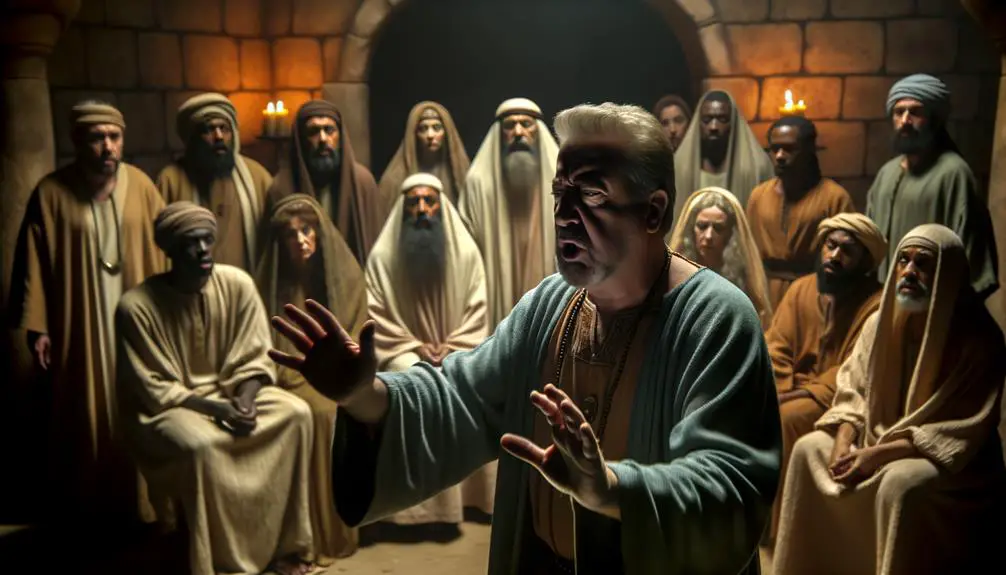
Reflecting on ancient beliefs, it's vital to understand how they shaped the moral and spiritual landscapes of their time, influencing both individual behavior and collective norms. The narrative of the familiar spirit in the Bible, particularly in the story of Samuel, provides fertile ground for dissecting how cultural context and ethical considerations intertwined within these ancient frameworks.
- Cultural Context: Ancient beliefs were deeply embedded within the societal structures, dictating norms and behaviors.
- Ethical Considerations: These beliefs often carried ethical mandates, guiding moral behavior and decision-making processes.
- Spiritual Interactions: The interaction with spirits or entities was governed by a complex set of rituals and taboos, reflecting both reverence and fear.
- Collective Norms: These beliefs weren't isolated but were part of the collective consciousness, influencing laws, customs, and social hierarchies.
In this light, the appeal to a familiar spirit in the story of Samuel isn't merely a historical anecdote; it's a window into the intricate web of spirituality, ethics, and societal norms that defined ancient life. The story underscores the tension between established religious doctrines and the human inclination towards mysticism and the supernatural, a dynamic that continues to influence contemporary spiritual practices.
Frequently Asked Questions
How Has Modern Spiritualism Interpreted the Concept of Familiar Spirits Compared to Ancient Biblical Times?
You'll find that modern spiritualism has reinterpreted familiar spirits through a lens of cultural syncretism, blending spiritual legalism from ancient texts with contemporary beliefs.
Unlike the strictly negative view in ancient biblical times, today's perspective is more nuanced. There's an appreciation for the complex roles these spirits can play, moving away from a purely adversarial role to one of guidance or partnership, reflecting broader shifts in how spirituality is understood and practiced.
Are There Any Recorded Instances Outside the Bible Where Similar Summoning of Spirits Occurred in Ancient Cultures?
Yes, ancient cultures outside the Bible practiced similar spirit summoning. Ancient necromancy, deeply rooted in cultural rituals, was widespread.
You'd find the Greeks and Romans invoking the dead through elaborate ceremonies, aiming to gain knowledge or guidance. These practices, rich in detail and methodology, offer a fascinating comparison to biblical narratives.
They underscore a universal human fascination with the afterlife and the desire to communicate with spirits, reflecting profound spiritual and existential inquiries across civilizations.
How Do Different Christian Denominations Today View the Story of Saul and the Witch of Endor in Terms of Its Implications for Spiritual Practices?
Today, you'll find that Christian denominations navigate the story of Saul and the Witch of Endor through varied lenses. Picture a tapestry, with each thread representing a church's doctrine; interdenominational views weave through, creating a complex image.
Some see it as a cautionary tale against occult practices, aligning strictly with church doctrine, while others delve into its deeper symbolism, analyzing its implications for spiritual practices with a more open, scholarly approach.
What Psychological Theories Could Explain King Saul's Motivation and State of Mind When He Sought Out the Witch of Endor?
You're exploring why Saul turned to the witch of Endor, focusing on his psychological state. Saul's desperation might stem from cognitive dissonance, facing failure against his values and expectations.
Psychological projection could also play a role; he might've externalized his internal conflicts and fears onto external sources, like seeking supernatural guidance. This approach suggests Saul was struggling with internal turmoil, seeking solutions outside himself to address his profound despair and confusion.
How Have Popular Media and Literature Adapted the Story of the Witch of Endor and the Summoning of Samuel's Spirit Into Their Narratives?
You've seen the Witch of Endor's story weave through popular media and literature, deeply influencing magic realism and Gothic literature. This tale's adaptation often explores themes of forbidden knowledge and the supernatural, integrating the summoning of spirits with a nuanced, scholarly touch.
Conclusion
In conclusion, you've delved deep into the murky waters of ancient beliefs, where familiar spirits and divine laws intertwine. The tale of King Saul and the Witch of Endor isn't just a story; it's a mirror reflecting the complex relationship between faith, power, and the afterlife.
Remember, 'Curiosity killed the cat,' but in seeking understanding, you've navigated the thin line between reverence and transgression.
This analysis not only enlightens but also challenges us to ponder the profound implications of our own beliefs.

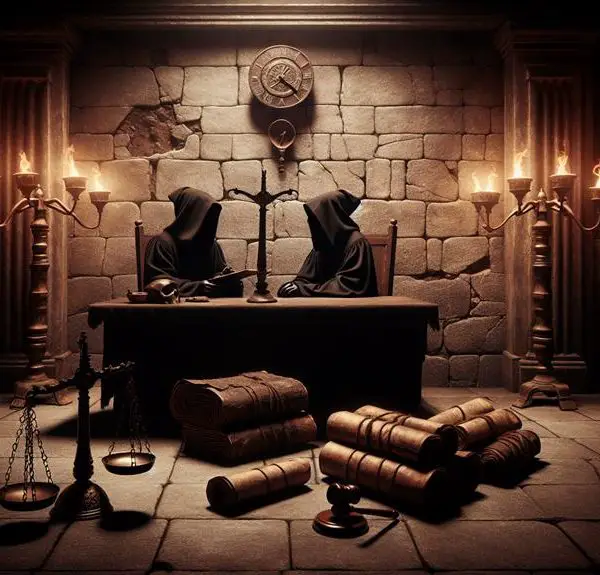
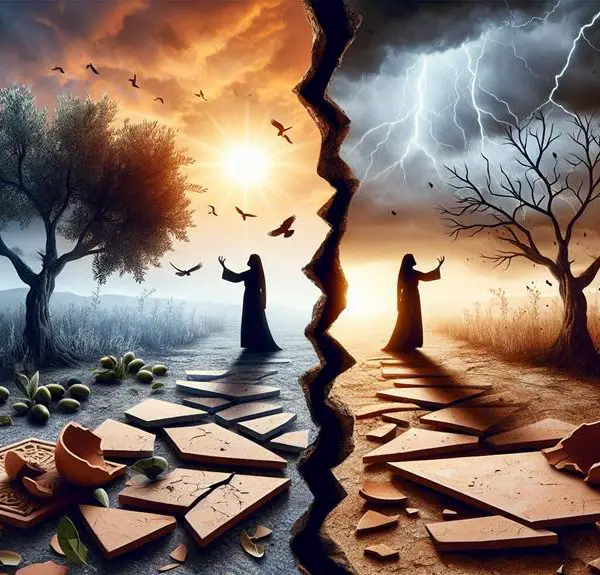
Sign up